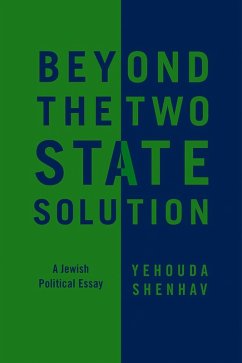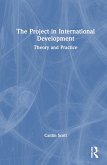"For over two decades, many liberals in Israel have attempted, with wide international support, to implement the two-state solution: Israel and Palestine, partitioned on the basis of the Green Line -- that is, the line drawn by the 1949 Armistice Agreements that defined Israel's borders until 1967, before Israel occupied the West Bank and Gaza following the Six-Day War. By going back to Israel's pre-1967 borders, many people hope to restore Israel to what they imagine was its pristine, pre-occupation character and to provide a solid basis for a long-term solution to the Israeli-Palestinian conflict. In this original and controversial essay, Yehouda Shenhav argues that this vision is an illusion that ignores historical realities and offers no long-term solution. It fails to see that the real problem is that a state was created in most of Palestine in 1948 in which Jews are the privileged ethnic group, at the expense of the Palestinians - who also must live under a constant state of emergency. The issue will not be resolved by the two-state solution, which will do little for the millions of Palestinian refugees and will also require the uprooting of hundreds of thousands of Jews living across the Green Line. All these obstacles require a bolder rethinking of the issues: the Green Line should be abandoned and a new type of polity created on the complete territory of mandatory Palestine, with a new set of constitutional arrangements that address the rights of both Palestinians and Jews, including the settlers."--Publisher's description.
"Poses interesting historical insights and assessments of present-day Israel." -- Morning Star
"Offers a meaningful critique to the ideology that the state has become undemocratic only because of the Six Day War." -- Jerusalem Post
"Finding it timely and noteworthy for its original insights into Israeli society, Palestinians in Ramallah promptly translated into Arabic this political commentary on the precarious state in which Israel finds itself. This updated version now appearing in English promises to further widen the circle of those who are beginning to realize that relevant political paradigms have undergone radical change, that a classical two-state solution to the conflict is a fantasy (and perhaps always has been), and that new realities require new ideas. This work certainly belongs to a new genre of writing on the conflict." -- Sari Nuseibeh, Al-Quds University
"Yehouda Shenhav makes an unusual and unsettling argument ... what appears on its face a 'progressive' position on the question of Israel and Palestine, is in fact censorial and duplicitous. The Israeli left's sanctimonious insistence in the face of the Jewish settlers of the West Bank that the settlements were illegal and that the proper borders of Israel are those of 1967, is nothing short of an ideological manoeuver. The purpose of the manoeuver is to obfuscate the fact that Israel itself is nothing short of a huge settlement project that was founded upon the displacement of hundreds of thousands of Palestinians and the systematic expropriation of the land they left behind." -- Lama Abu Odeh, from the foreword Normal 0 false false false EN-GB ZH-CN TH MicrosoftInternetExplorer4
'Finding it timely and noteworthy for its original insights into Israeli society, Palestinians in Ramallah promptly translated into Arabic this political commentary on the precarious state in which Israel finds itself. This updated version now appearing in English promises further to widen the circle of those who are beginning to realize that relevant political paradigms have undergone radical change, that a classical two-state solution to the conflict is a fantasy (and perhaps always has been), and that new realities require new ideas. This work certainly belongs to a new genre of writing on the conflict.' -- Sari Nuseibeh, Al-Quds University
'Yehouda Shenhav makes an unusual and unsettling argument...: what appears on its face a 'progressive' position on the question of Israel and Palestine, is in fact censorial and duplicitous. The Israeli left's sanctimonious insistence in the face of the Jewish settlers of the West Bank that the settlements were illegal and that the proper borders of Israel are those of 1967, is nothing short of an ideological maneuver. The purpose of the maneuver is to obfuscate the fact that Israel itself is nothing short of a huge settlement project that was founded upon the displacement of hundreds of thousands of Palestinians and the systematic expropriation of the land they left behind.' -- Lama Abu Odeh, from the Foreword
"Offers a meaningful critique to the ideology that the state has become undemocratic only because of the Six Day War." -- Jerusalem Post
"Finding it timely and noteworthy for its original insights into Israeli society, Palestinians in Ramallah promptly translated into Arabic this political commentary on the precarious state in which Israel finds itself. This updated version now appearing in English promises to further widen the circle of those who are beginning to realize that relevant political paradigms have undergone radical change, that a classical two-state solution to the conflict is a fantasy (and perhaps always has been), and that new realities require new ideas. This work certainly belongs to a new genre of writing on the conflict." -- Sari Nuseibeh, Al-Quds University
"Yehouda Shenhav makes an unusual and unsettling argument ... what appears on its face a 'progressive' position on the question of Israel and Palestine, is in fact censorial and duplicitous. The Israeli left's sanctimonious insistence in the face of the Jewish settlers of the West Bank that the settlements were illegal and that the proper borders of Israel are those of 1967, is nothing short of an ideological manoeuver. The purpose of the manoeuver is to obfuscate the fact that Israel itself is nothing short of a huge settlement project that was founded upon the displacement of hundreds of thousands of Palestinians and the systematic expropriation of the land they left behind." -- Lama Abu Odeh, from the foreword Normal 0 false false false EN-GB ZH-CN TH MicrosoftInternetExplorer4
'Finding it timely and noteworthy for its original insights into Israeli society, Palestinians in Ramallah promptly translated into Arabic this political commentary on the precarious state in which Israel finds itself. This updated version now appearing in English promises further to widen the circle of those who are beginning to realize that relevant political paradigms have undergone radical change, that a classical two-state solution to the conflict is a fantasy (and perhaps always has been), and that new realities require new ideas. This work certainly belongs to a new genre of writing on the conflict.' -- Sari Nuseibeh, Al-Quds University
'Yehouda Shenhav makes an unusual and unsettling argument...: what appears on its face a 'progressive' position on the question of Israel and Palestine, is in fact censorial and duplicitous. The Israeli left's sanctimonious insistence in the face of the Jewish settlers of the West Bank that the settlements were illegal and that the proper borders of Israel are those of 1967, is nothing short of an ideological maneuver. The purpose of the maneuver is to obfuscate the fact that Israel itself is nothing short of a huge settlement project that was founded upon the displacement of hundreds of thousands of Palestinians and the systematic expropriation of the land they left behind.' -- Lama Abu Odeh, from the Foreword








